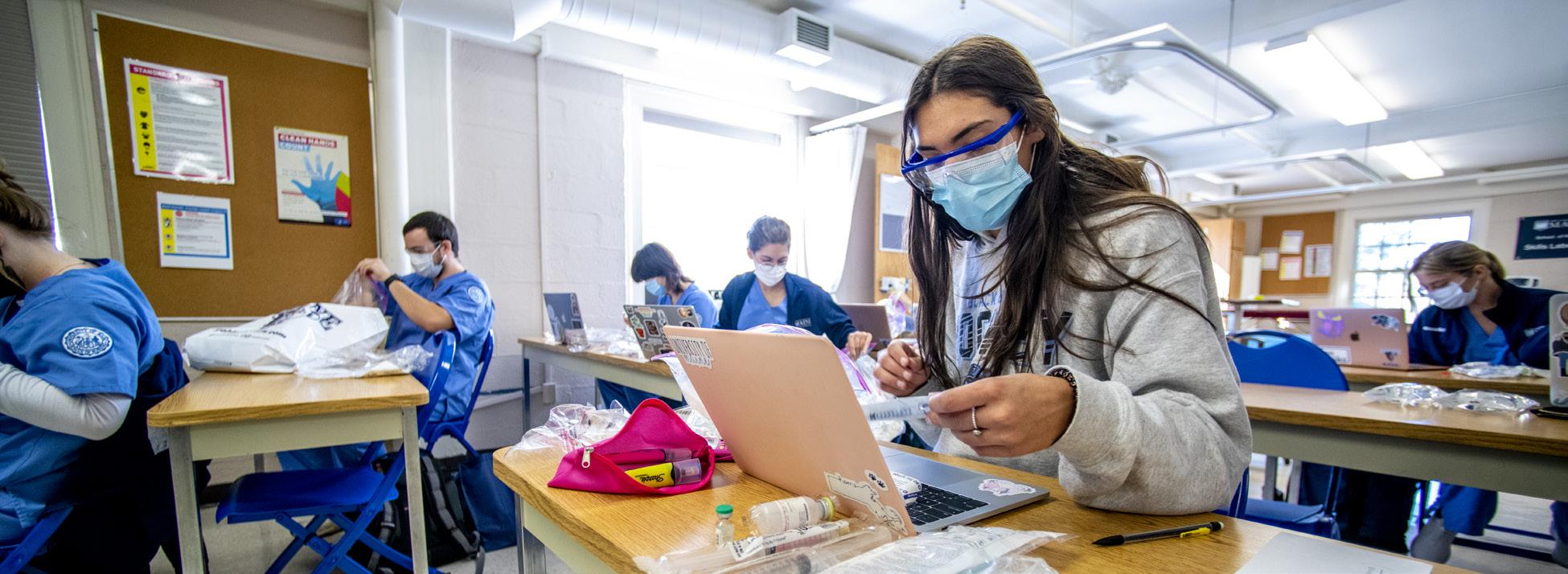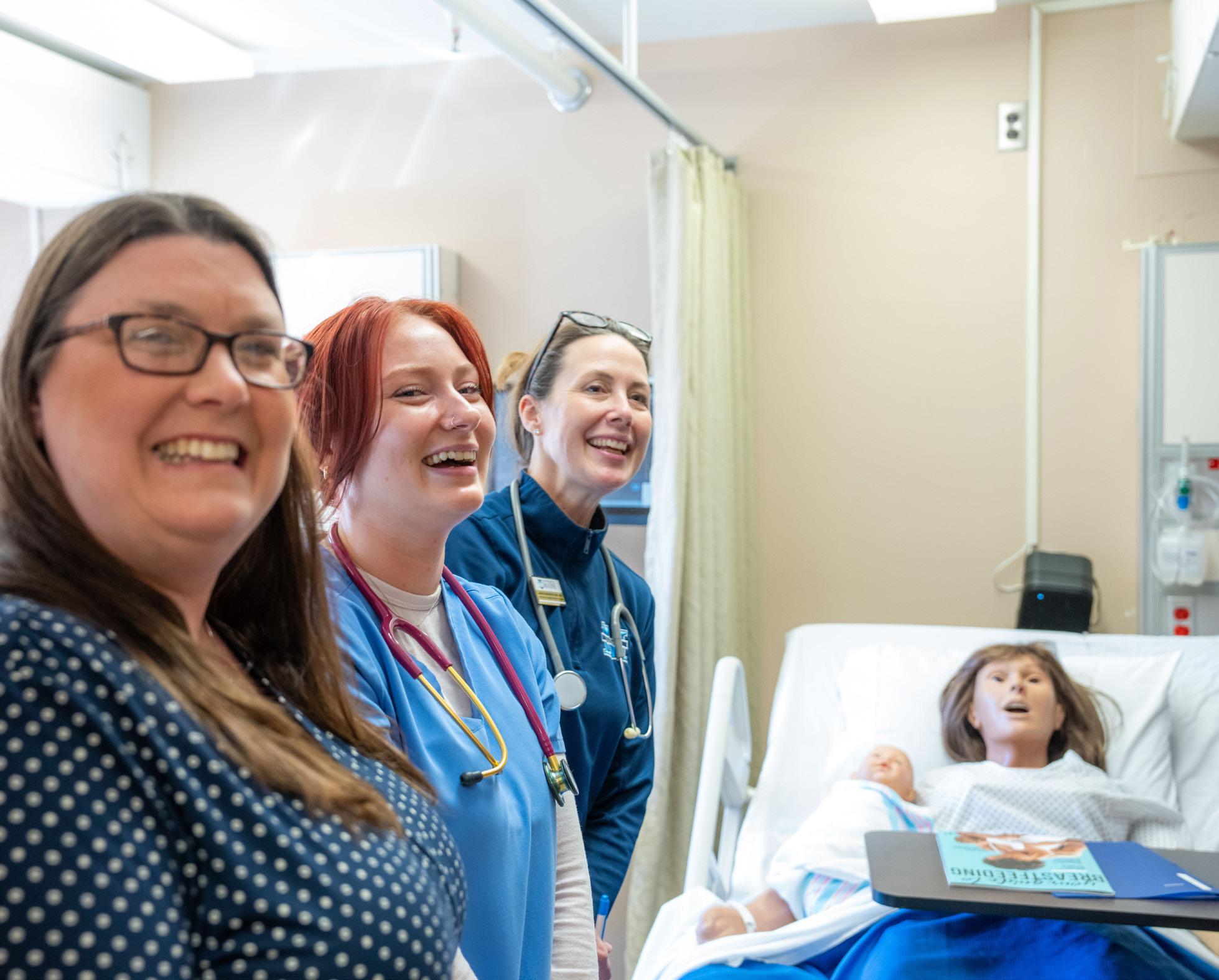
2 minute read
Academic Programming
GOAL:
Educate nurses for the future by advancing rigorous and effective academic programs that align with standards set forth by accreditors and professional licensing boards and are informed by program evaluation data.
STRATEGIC PRIORITY (OBJECTIVE) KEY STRATEGIES/ACTIONS OUTCOME(S)
Align undergraduate and graduate curricula with standards set forth by accrediting and quality standards as applicable.
Map BSN and graduate curricula to the new AACN Essentials standards utilizing backwards design.
Transition to a competency-based curriculum for BSN and MSN programs through structured faculty collaboration.
Map MSN and MSN-FNP curricula to new AACN Essentials, NONPF Core Competencies, APRN Doctoral Competencies and Standards for Quality Nurse Practitioner Education.
Identify and address gaps in curriculum map.
Explore the feasibility and map a Doctorate of Nursing Practice (DNP) degree program with a Family Nurse Practitioner (FNP) track.
By spring 2023, faculty will vote to accept new leveled program outcomes for undergraduate programs mapped to new AACN Essentials.
By spring 2024, faculty will vote to accept new leveled program outcomes for graduate programs mapped to new AACN Essentials.
By fall 2025, all BSN and MSN courses (as documented in syllabi), simulation evaluation tools and clinical evaluation tools will be mapped to the new AACN Essentials and will be consistent with competency based education standards.
Ensure compliance in areas of accreditation deficiency by using feedback from the 2020 CCNE accreditation visit.
Ensure that program outcomes demonstrate program effectiveness at the graduate level.
Use program outcome data to improve program quality at the graduate level.
Ensure all full-time, part-time and adjunct faculty and clinical instructors are at a minimum MSN-prepared.
By fall 2025, all graduate faculty will have revised program evaluation measures and benchmarks to measure teaching effectiveness.
By fall 2024, all graduate faculty will adopt a process to annually use program evaluation data to make curriculum changes to improve program quality.
By spring 2025, all full-time, parttime and adjunct faculty and clinical instructors will either be enrolled in a masters and/or doctoral program in nursing, or completed a masters program in nursing.
STRATEGIC PRIORITY (OBJECTIVE) KEY STRATEGIES/ACTIONS OUTCOME(S)
Update program evaluation and quality improvement plan for undergraduate program.
Determine measures and benchmarks using Kirkpatrick’s model.
Identify individuals/committees responsible for tracking specific measures and implementing changes as needed.
Specifically address quality, safety and evidence-based practice competencies in clinical education.
Annually, faculty will adopt an updated program evaluation and quality improvement plan.
Annually, key program tracking individuals will be identified and program evaluation data will be tracked and filed in a central location.
Prepare for changes associated with NCLEX NextGen (NGN).
Update undergraduate curriculum to incorporate and prepare learners for new NGN-style evaluation questions.
Revise the Master of Science nurse educator curriculum to include content that will prepare undergraduate students for licensure examination success.
Provide faculty with continuing education and resources about NCLEX NGN.
Develop assessment and evaluation guidelines that support inclusivity and diverse learning styles.
By spring 2027, the NCLEX NGN pass rate will be at or exceed the national average.
By fall 2023, faculty will be scheduled for NCLEX NGN educational sessions and there will be a continually updated NCLEX NGN electronic repository with educational resources folder.
By fall 2023, testing guidelines that support inclusivity and diverse learning styles will be developed and available to faculty in the NCLEX NGN electronic repository with educational resources folder and followed.
Revise all courses with a nurse education focus to meet the needs of community partners and enhance program growth.
Identify curricular gaps informed by feedback from faculty, course evaluations, alumni and community partners.
Map the curriculum to the National League of Nursing Certified Nurse Educator competencies.
Design course content to address education in clinical, laboratory and didactic settings that is consistent with industry needs, accreditation standards and licensing requirements.
By fall 2025, nurse educator course learning objectives and content will be reflective of revisions.
By spring 2027, the MSN-nurse educator track will expand to include an additional 10 clinical partnerships.
By fall 2023, develop and implement an advanced level nursing education work group to address curricular needs in the MS-nurse educator track.




